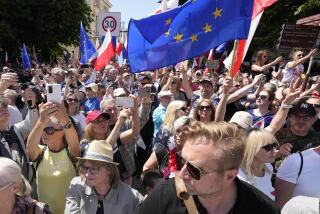50,000 Celebrate Bulgaria Reforms : East Bloc: Rally at cathedral in Sofia lauds the nation’s ‘real liberation.’ Speakers call for the prosecution of deposed longtime leader Todor Zhivkov.
SOFIA, Bulgaria — In the biggest independently organized political rally here in 40 years, thousands of Bulgarians assembled on the steps of a Bulgarian Orthodox church Saturday to celebrate a new government and appeal for greater freedom.
More than 50,000 people gathered around the Byzantine-style Alexander Nevsky Cathedral in the center of Sofia in a rally called by representatives of Bulgaria’s emerging opposition movement, a small-scale version of reform movements elsewhere in Eastern Europe.
In ecstatic speeches that often produced tears and wild applause, orators proposed everything from the elimination of Bulgaria’s notorious secret police to the introduction of religious instruction in public schools.
“There should be a Bible in every home. God bless democracy,” said Kristofor Sibev, an Orthodox priest affiliated with an organization of independent clergy. The official Bulgarian Orthodox Church here had long been allied with the ruling Communist regime of deposed Bulgarian leader Todor Zhivkov, Europe’s longest-serving ruler until he was ousted Nov. 10.
Although plainclothes secret police were scattered among the crowd, sometimes posing as journalists, authorities made no effort to disband the demonstration, which lasted more than three hours in sunny but cold weather.
Perhaps the most emotional moment came during a speech by a Bulgarian peasant leader, Daniyan Georgiev.
“Today is the real liberation of Bulgaria,” said Georgiev, who was stripped of his position in the Bulgarian Communist Party more than 20 years ago after a confrontation with Zhivkov. “We have taken the power, and we will not let go.”
Surveying the crowd through tear-filled eyes, Georgiev said: “Even when my son was born I was not so happy.”
The large political rally in the yellow-brick square in Sofia was unthinkable only eight days ago before the surprising exit of Zhivkov, 78. He was forced to resign during a meeting of the Central Committee of the Bulgarian Communist Party and was replaced as general secretary by Foreign Minister Petar Mladenov.
Although intimately linked with the Zhivkov regime for more than 20 years, Mladenov, 53, immediately gave signals that his government would be open to perestroika- style reforms inspired by Soviet leader Mikhail S. Gorbachev. Three days ago, he presided over a meeting of the Central Committee as three Zhivkov regime hard-liners were expelled from the nine-member Politburo.
On Friday, he told members of the National Assembly that he favors an independent legislature. Meeting with foreign reporters during a break in the assembly session, Mladenov also said he favors “free elections.” He did not elaborate.
Perhaps most important, in the context of the great political revolution taking place in Eastern Europe, Mladenov met with opposition leaders and promised he would not interfere in the independent political rally that took place Saturday.
The rally was a political milestone in long-repressed Bulgaria, a country of 9 million people on the Balkan peninsula between the Danube River to the north and Greece and Turkey to the south. Most of the speeches Saturday contained praise for Mladenov and his new regime.
“I have confidence in him (Mladenov),” said University of Sofia Prof. Kiriev Vasiliv. “The fact that this meeting is taking place demonstrates that Petar Mladenov is for reform. We must give him support.”
However, speaker after speaker urged investigation and prosecution of Zhivkov, who ruled for 35 years. Many posters depicted Zhivkov behind bars. Some demonstrators burned his portrait.
The politically tensest moment in the rally came during a speech by Roman Vodinicharov, leader of the Independent Committee for Human Rights. He urged the new government to make peace with Bulgaria’s minority Turkish population, which suffered greatly under the Zhivkov regime.
“For 20 years, the 1.5 million Bulgarian Muslims have suffered from the forced assimilation of the Zhivkov regime,” Vodinicharov said. Among other abuses, he noted that Bulgarian ethnic Turks had been forced to change their Muslin names to Orthodox Christian names. Because of the discrimination, more than 300,000 ethnic Turks fled Bulgaria to Turkey over the summer.
Vodinicharov urged that the ethnic Turks be welcomed back, but his appeal appeared to split the audience gathered in the square. “We don’t want them,” one woman shouted. “Stop talking,” shouted another.
Finally, a rally organizer was forced to intervene and remind the hostile woman that the meeting was called as a pro-freedom of speech gathering, open to differing ideas.
More to Read
Sign up for Essential California
The most important California stories and recommendations in your inbox every morning.
You may occasionally receive promotional content from the Los Angeles Times.










